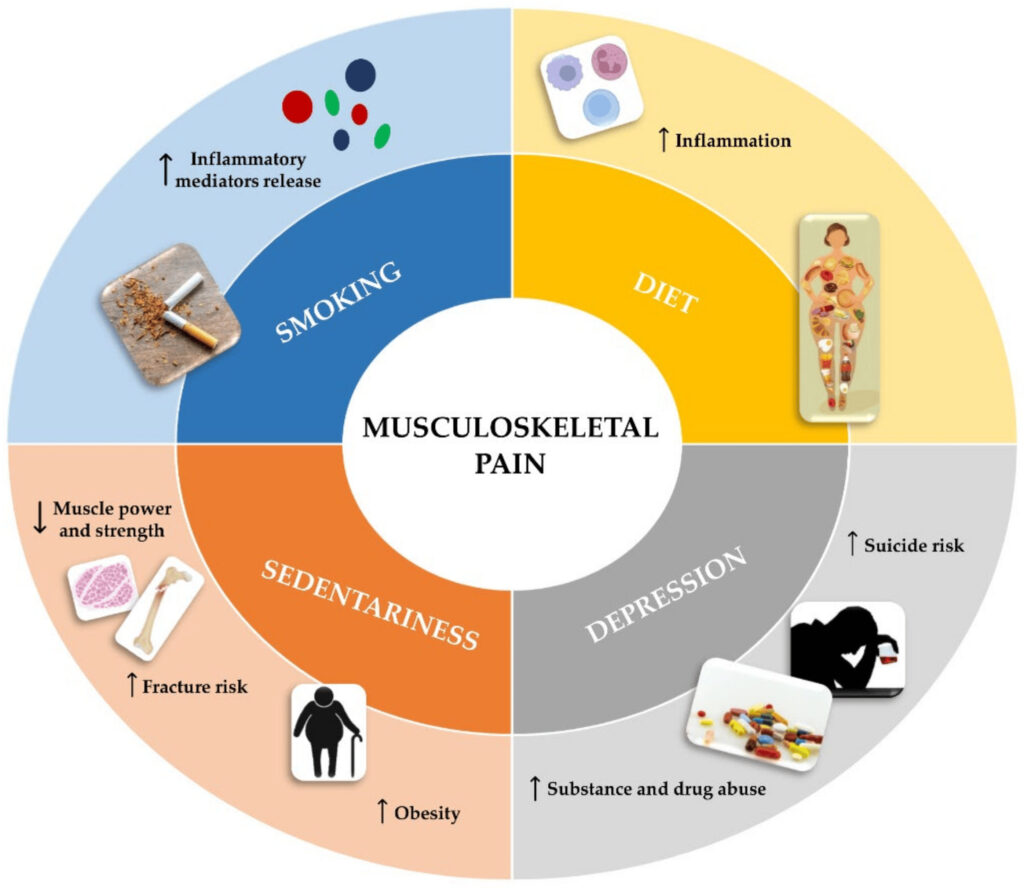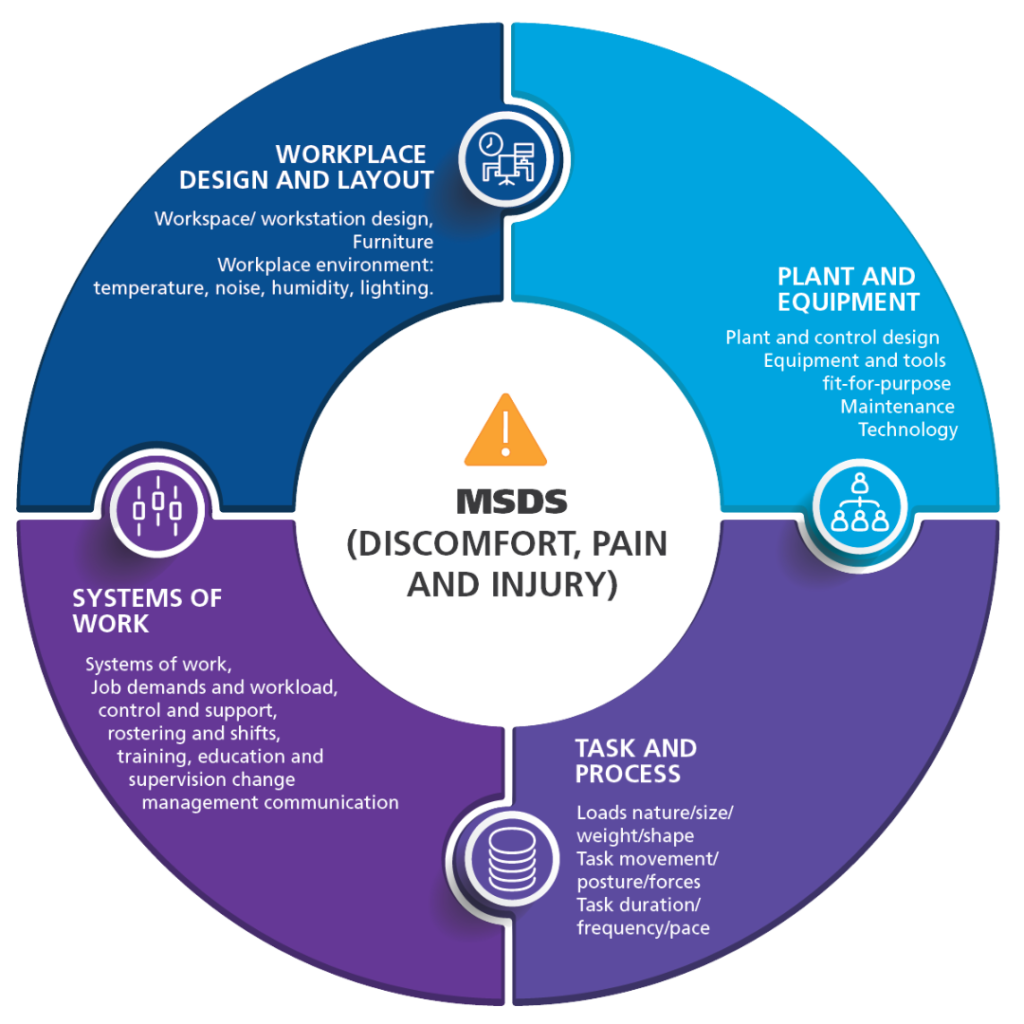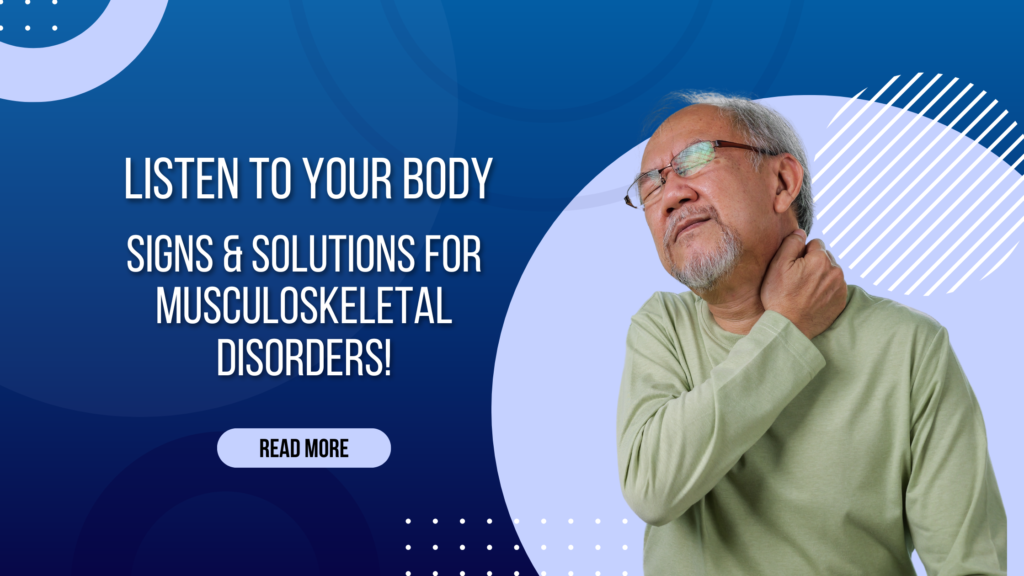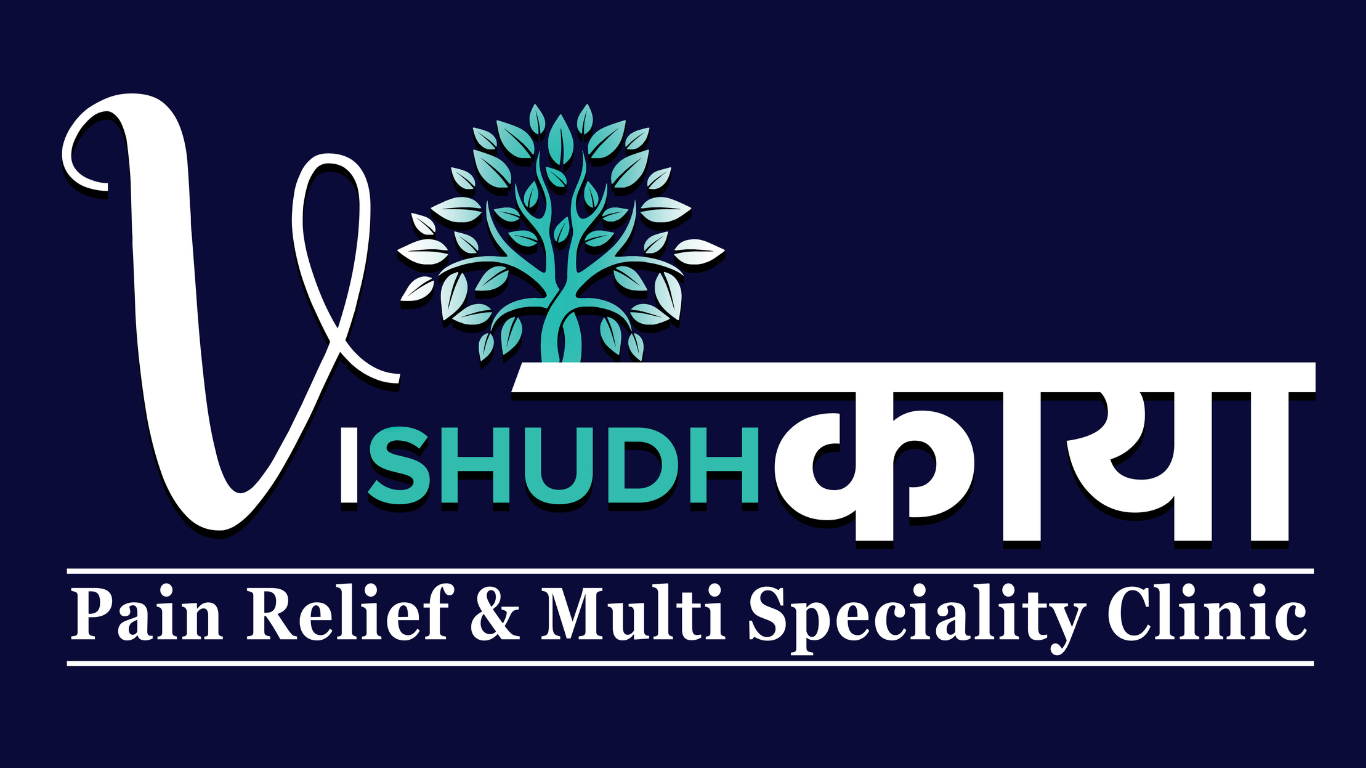Musculoskeletal Disorders: What They Are and Why They Matter
Musculoskeletal Disorders (MSDs) encompass a wide range of conditions that impact the body’s movement system, including muscles, bones, joints, tendons, ligaments, and nerves. These Musculoskeletal disorders symptoms can lead to pain, reduced mobility, and challenges in performing everyday tasks, often resulting in a diminished quality of life.
Common Types of Musculoskeletal Disorders

MSDs can manifest in various forms, affecting different parts of the body. Some of the most prevalent examples include:
● Back Pain: A widespread issue often linked to poor posture, muscle strain, spinal injuries, or age-related degeneration.
● Arthritis: A chronic condition that causes joint inflammation, stiffness, swelling, and pain, with types such as osteoarthritis and rheumatoid arthritis being particularly common.
● Carpal Tunnel Syndrome: A nerve-related condition caused by compression of the median nerve in the wrist, often associated with repetitive hand and wrist movements.
● Tendinitis: Inflammation or irritation of tendons, commonly occurring in areas like the shoulder (rotator cuff), elbow (tennis elbow), and knee (jumper’s knee).
● Osteoporosis: A condition characterized by a decrease in bone density, making bones fragile and more susceptible to fractures.
The Global Impact of Msds
Musculoskeletal disorders are among the most significant health challenges worldwide, affecting people of all ages and occupations. Key statistics underline their prevalence and impact:
● The World Health Organization (WHO) reports that MSDs are the leading cause of disability globally, affecting individuals’ ability to work, move, and engage in daily activities.
● An estimated 1.71 billion people around the world are affected by musculoskeletal conditions, with low back pain being the most frequently reported issue.
● MSDs contribute significantly to work-related injuries, accounting for approximately 30% of all work absences in many industries, particularly those requiring repetitive physical activity or heavy lifting.
Why Msds Deserve Attention?
MSDs not only reduce individual well-being but also place a heavy economic burden on healthcare systems and employers due to treatment costs and lost productivity. Awareness, early intervention, and preventive measures, such as maintaining good posture, engaging in regular exercise, and avoiding repetitive strain, are crucial for minimizing the impact of these disorders.
By addressing MSDs comprehensively, individuals and communities can improve their quality of life while reducing the overall burden of these conditions on society.
Can You Spot the Signs of Musculoskeletal Disorders?
Musculoskeletal disorders (MSDs) can affect your mobility and overall well-being. Early recognition of the symptoms is essential for effective management and recovery.
Common Symptoms of Musculoskeletal Disorders
“Do You Recognize These Signs of Musculoskeletal Disorders?”
Watch for these key indicators that could signal a musculoskeletal condition:
● Chronic or Recurrent Pain: Persistent discomfort in the back, neck, or joints that don’t subside or keep returning.
● Stiffness or Limited Flexibility: Difficulty moving joints freely or feeling rigid, especially after periods of rest or inactivity.
● Swelling, Warmth, or Redness: Signs of inflammation that may appear in muscles, tendons, or joints.
● Muscle Weakness and Fatigue: A sense of tiredness or reduced strength that interferes with routine activities.
Why Early Detection Is Crucial
Delaying treatment for these symptoms can lead to more severe complications, including chronic pain and permanent loss of mobility. The earlier you address these issues, the easier it is to manage the condition and prevent it from worsening.
Pay attention to these warning signs, and don’t hesitate to seek professional help to safeguard your health.
What Causes Musculoskeletal Disorders?
Unmasking the Causes of MSDs: It’s More Than Just Wear and Tear
Musculoskeletal disorders (MSDs) are frequently seen as the result of simple ageing or repetitive use of muscles and joints. However, the underlying causes are more varied and complex. Understanding these factors is crucial for effective prevention and treatment.

1. Chronic Overuse: Repetitive Movements, Poor Posture, or Prolonged Static Positions
A major cause of MSDs is the chronic strain on muscles and joints from overuse. Repeating certain actions, such as typing, lifting, or twisting, can cause damage to the muscles, tendons, and ligaments. Poor posture, whether standing or sitting, adds extra pressure on the musculoskeletal system. Likewise, staying in one position for too long—like sitting at a desk or driving for hours—can restrict blood flow, leading to discomfort and long-term issues.
2. Acute Injuries: Sudden Impact, Accidents, or Trauma
Acute injuries, such as those caused by sudden accidents or impacts, can cause immediate harm to muscles, bones, tendons, or ligaments. Whether it’s a fall, an accident, or sports-related trauma, these events often result in fractures, sprains, strains, or dislocations, and if not properly managed, they can lead to chronic pain and dysfunction.
3. Age-Related Changes: Wear of Joints, Cartilage, and Bones
As we age, the body experiences natural wear and tear. The cartilage that cushions the joints may deteriorate, leading to conditions like osteoarthritis. Bone density decreases, making bones more fragile and prone to fractures. Additionally, muscle strength and flexibility decrease with age, which can cause instability and increase the risk of injury.
4. Underlying Health Conditions: Autoimmune Disorders and Metabolic Diseases
Health conditions like autoimmune disorders or metabolic diseases can also contribute to MSDs. Conditions such as rheumatoid arthritis, where the body attacks its joints, result in inflammation, pain, and stiffness. Metabolic disorders like diabetes can impair the body’s ability to repair tissues, affecting circulation and further raising the risk of musculoskeletal problems.
5. Lifestyle Factors: Inactivity, Obesity, and Poor Nutrition
A sedentary lifestyle, obesity, and poor dietary habits can all influence the development of MSDs. Lack of physical activity weakens muscles, reduces flexibility, and affects posture, all of which can lead to discomfort and injuries. Being overweight places extra pressure on joints, especially in the lower back, knees, hips, and feet. Additionally, a diet lacking essential nutrients such as calcium, vitamin D, and magnesium can weaken bones and muscles, increasing susceptibility to musculoskeletal disorders.
While the natural ageing process and wear and tear are important factors, other elements—such as chronic overuse, acute injuries, age-related changes, underlying health conditions, and lifestyle choices—also significantly contribute to the development of MSDs. By focusing on maintaining good posture, preventing injuries, staying active, and following a balanced diet, it’s possible to reduce the risk of these disorders and support overall musculoskeletal health.
What Increases Your Risk of Developing Msds?

The risk of developing musculoskeletal disorders (MSDs) is influenced by several factors, including your work environment, physical activity practices, mental health, and lifestyle habits. Understanding these risks can help you take proactive measures to reduce the likelihood of injury and support musculoskeletal health.
1. Workplace Ergonomics – The setup of your workspace plays a major role in the development of MSDs. Poorly designed workstations, such as desks at incorrect heights, uncomfortable seating, or improperly positioned monitors, force the body into unnatural positions, leading to muscle and joint strain. Repetitive tasks, such as typing, lifting, or standing for long periods, can also put sustained pressure on the body, contributing to the risk of musculoskeletal injuries.
2. Physical Activities – While physical activity is essential for maintaining health, improper exercise or sports techniques can cause musculoskeletal injuries. Using poor form during activities like weightlifting or running places additional stress on muscles, tendons, and joints. Additionally, neglecting strength and flexibility training can leave muscles and joints less prepared to handle physical demands, increasing the risk of injury.
3. Psychological Factors – Mental health can significantly affect the development and severity of MSDs. Stress can cause muscle tightness, resulting in pain and discomfort. It can also amplify pain perception, making minor aches feel more intense. Conditions like anxiety and depression can hinder the ability to manage pain effectively, potentially leading to chronic issues if left unaddressed.
4. Environmental and Lifestyle Factors – Lifestyle choices, such as smoking, poor nutrition, and inadequate sleep, can also contribute to the development of MSDs. Smoking restricts blood flow, slowing down tissue healing, while poor nutrition deprives the body of important nutrients needed for strong bones and muscles. Lack of sleep hinders the body’s natural recovery process, making the musculoskeletal system more prone to strain and injury.
The risk of developing MSDs is determined by a combination of workplace conditions, physical activity habits, mental health, and lifestyle choices. By improving ergonomics at work, practising proper exercise techniques, managing stress, and adopting healthier lifestyle habits, you can reduce the risk of musculoskeletal disorders and enhance your overall musculoskeletal health.
How Vishudh Kaya Can Help: Solutions for musculoskeletal problems
“Reclaim Your Life with Vishudh Kaya’s Holistic Care”
At Vishudh Kaya, we understand how musculoskeletal disorders (MSDs) can disrupt your life, causing persistent pain, and restricted mobility, and affecting your overall quality of life. We offer a holistic and comprehensive approach that combines both modern and traditional Physiotherapy for musculoskeletal issues to address the underlying causes of your MSDs and help you live pain-free.
How Vishudh Kaya Addresses MSDs
Personalized Treatment Plans: We create individualized treatment plans tailored to your specific needs, incorporating a combination of therapies that promote healing, restore function, and support long-term health:
✔ Ayurveda: Drawing on the wisdom of Ayurveda, we offer natural remedies designed to balance your body’s energies. Ayurvedic therapies, including herbal treatments, oils, and detoxification methods like panchakarma, help reduce inflammation, relieve pain, and encourage the body’s natural healing processes.
✔ Physiotherapy: Our Physiotherapy for musculoskeletal issues are crafted to help improve mobility, and strength, and reduce pain. This may include manual therapy, exercise-based rehabilitation, and posture correction techniques to restore function and prevent injury.
✔ Chiropractic Care: Chiropractic care focuses on spinal health, with gentle adjustments aimed at correcting misalignments that may be contributing to musculoskeletal pain. By restoring proper alignment, chiropractic treatments help alleviate discomfort and enhance overall nerve function.
✔ Osteopathy: Osteopathic treatments address the body’s structural balance by using hands-on techniques to treat musculoskeletal conditions. Osteopaths focus on realigning bones and joints to promote healing, reduce pain, and improve circulation.
✔ Allopathic Medicine: When necessary, we integrate allopathic treatments, such as medications or surgical interventions, to address acute medical conditions. Our allopathic care complements our holistic approach, ensuring your pain management and recovery are fully supported.
✔ Homeopathy: Homeopathy provides a gentle, natural approach to treating musculoskeletal disorders. We offer individualized remedies that stimulate the body’s self-healing abilities, addressing pain, inflammation, and other issues without the side effects of conventional treatments.
Expert Guidance: Along with our therapies, we provide expert advice to help you improve your daily habits and prevent further injury:
✔ Posture Improvement: Poor posture is a key factor in many musculoskeletal issues. We offer personalized guidance to help you maintain proper posture, reducing strain and preventing further damage to your muscles and joints.
✔ Ergonomic Assessments: Our team will assess your home and work environments to provide ergonomic solutions that reduce physical strain. We offer advice on workstation adjustments and habits that support your musculoskeletal health throughout your daily activities.
✔ Injury Prevention: Prevention is crucial in maintaining musculoskeletal health. We educate you on proper exercise techniques, the importance of warm-ups and cool-downs, and strengthening exercises that protect your body from injury and promote overall well-being.
Vishudh Kaya utilizes chiropractic care, osteopathy, Ayurveda, allopathy, homoeopathy, and physiotherapy to provide a holistic, multifaceted approach to treating and preventing MSDs. Each therapy is tailored to your specific needs, ensuring a well-rounded approach to your recovery and long-term health.
Vishudh Kaya Pain Relief and Multispeciality Clinic is here to provide you with personalized, holistic care. Our team specializes in offering comprehensive assessments and treatments that address a wide range of conditions, including respiratory concerns, musculoskeletal pain, and chronic issues.
Start Your Journey to Better Health. If you’re ready to take control of your health and regain your vitality, Vishudh Kaya is here to support you. Whether you’re recovering from an injury, managing chronic pain, or seeking to improve your overall musculoskeletal health, our holistic approach can help you achieve lasting relief. Contact us today to schedule a consultation and begin your path to a pain-free and active life.
“Don’t let musculoskeletal pain hold you back. Reach out to Vishudh Kaya today to book your consultation and start your journey to relief and recovery!“
📞 Call us at: +91-76781 35151
📍 Visit us at: #8566, Sector 125, Sunny Enclave, Kharar, Mohali, Punjab 140301
🌐 Book online at: https://vishudhkaya.com/
Don’t wait—empower yourself with Vishudh Kaya Pain Relief and Multispeciality Clinic!


